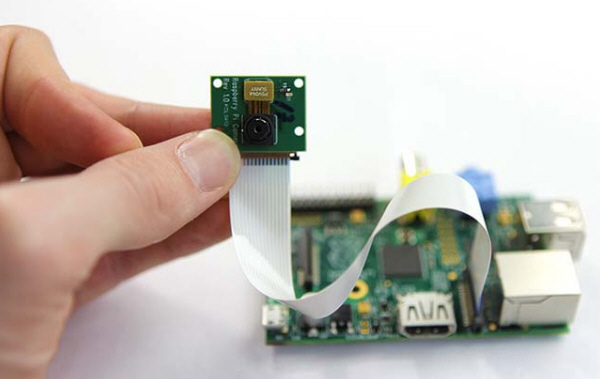Raspberry Pi’s camera board now available

Raspberry Pi, the popular credit card-sized ARM GNU/Linux computer, now has a camera add-on. A year in the making, the camera board consists of a small lens on a chip around the size of a postage stamp, attached to a flex cable.
Connecting the module is just a matter of opening the camera port on the Raspberry Pi (it’s situated between the Ethernet and HDMI ports) and inserting the flex. The process is a little fiddly, but easy enough.
The camera module is very sensitive to static electricity so you’ll need to be careful when getting it out of the box and handling it in general.
Once connected, fire up the Pi, make sure you’re running the latest firmware, and access the configuration settings by entering: "sudo raspi-config".
Navigate to “Camera” in the menu and enable the board.
Naturally, taking shots with the camera isn’t as easy as simply pressing a button. There are three applications provided: raspistill, raspivid and raspistillyuv and to use them you have to enter some commands. For example, "raspistill -o image.jpg" will capture an image, while "raspivid -o video.h264 -t 10000" will record a ten second video (without sound).
The camera can stream video over a network on Linux, Windows and OS X.
Although the module is a 5-megapixel camera capable of capturing 1080p video, the quality of the shots generally aren’t amazing, but you can improve the results by tweaking elements like sharpness, contrast, brightness, saturation, and ISO, all using commands. You can also turn off the Automatic White Balance and choose a mode like Sun (for shooting on sunny days), Cloud, Shade, and Fluorescent.
There are various effects available too, such as Posterize, Watercolor, Oilpaint and Sketch.
To encourage creativity, and show other users what’s possible, there’s a Photography Competition available to enter now.
You can order the board from RS Components or Premier Farnell/Element14 in the UK, and it’s priced at £16.56 plus postage. At the moment it's showing as out of stock, but more should be arriving soon. US customers should keep an eye on the Allied Electronics site.
If you own a Raspberry Pi do you plan on getting the new camera module?
